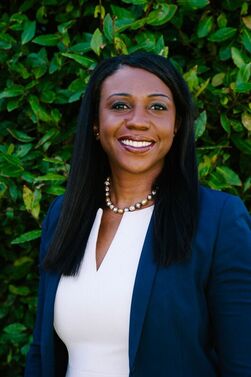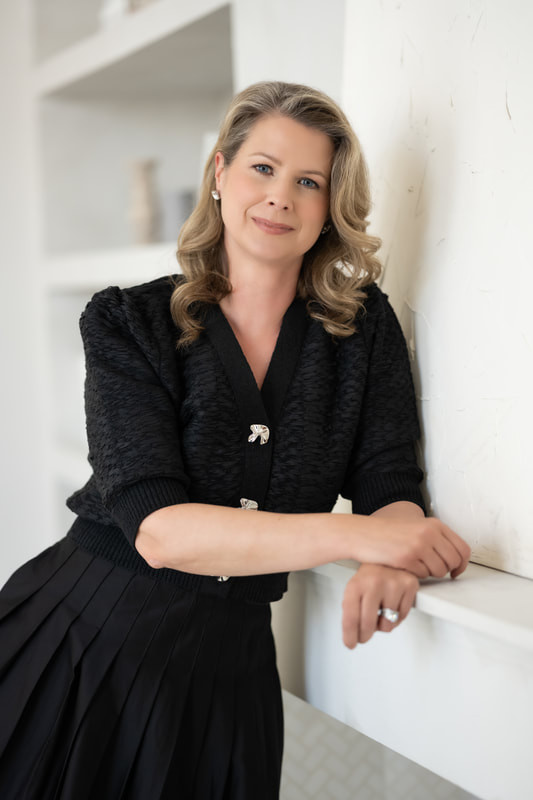 Welcome back to the "Women Leading In Law" blog series, where everyone can read about the personal experiences of some amazing lawyers from across the country and learn great advice on succeeding and leading in law. Today's post features litigator Tanya Walker the founder of Walker Law Professional Corporation: 1. Tell me a little about your practice or business. I am the owner and founder of Walker Law Professional Corporation. I opened the firm initially on Bay Street ten years ago with the aid of a part-time assistant and a $5,000 loan from my father. Walker Law is now located in the nucleus of the financial district. The firm employs eight full time staff members. At Walker Law, tasks are delegated based on complexity, meaning that a junior lawyer, articling student, or paralegal is provided with the opportunity to work on a client’s file while being supervised by a senior lawyer. This strategy reduces clients’ legal fees because the client is billed at the significantly lower rate of a paralegal or junior lawyer and is only charged for the supervision of the senior lawyer. Not only does this strategy benefit clients, but also the junior on the file. When given the opportunity to work on a client file, the junior staff member tends to experience a higher morale because he or she is presented with the opportunity to learn and develop. Walker Law provides litigation assistance focusing on facets of civil litigation including property, employment and contract law. The firm has been retained to represent clients at various stages of the dispute resolution process. We represent small to medium sized businesses as well as Fortune 500 companies. 2. Why did you go to law school? As a child, I wanted to become a lawyer because I watched the Cosby Show and aspired to be like Claire Huxtable, the black mother on the show who worked as a lawyer. My aspiration was reinforced by encouragement from my parents who observed my argumentative spirit and felt that I would be a good fit as a lawyer. 3. How did you get to where you are today? Design? Chance? Both? I owe my success to hard work, my parents, and my mentors. Initially it was my parents who at a very young age instilled in my sister and I “big picture thinking” which meant investing time and energy on things that result in getting you where you need to go. One aspect of that big picture thinking is to believe that any goal that we desire is attainable and to start working towards that goal. Since I knew I wanted to be a lawyer, my parents taught me to be well rounded, to work hard, and to effectively manage my time. Shortly after I was called to the bar, I was accepted to work at a firm on Bay Street. During this time, a law firm was previously hired to assist ours with a complicated litigation matter. I was assigned to be a junior lawyer on the file and developed a relationship with the two partners at the law firm. During my fourth year of practice, the partners offered me the opportunity to open my law firm by renting office space from them. They also agreed to mentor me. After I first opened Walker Law, I started working out at a luxury gym in downtown Toronto in hopes of meeting influential people. It was in my spin class at that gym I met John Campion, one of the leading lawyers in Canada, who encouraged me to run for Bencher and mentored me in running a campaign, to the extent that I saw him as my campaign manager. Overall, having guidance from the right mentors enabled me to be prepared for the right opportunity. 4. What is your most significant achievement? What are you proud of? My most significant achievement is becoming the first female black elected Bencher from Toronto in the 223-year history of the Law Society and being re-elected last year. There are 40 lawyer Benchers that are elected every four years by lawyers and in Toronto you usually require approximately 3,000 votes from lawyers to be elected. Last year there were over 120 lawyer candidates. As a Bencher, I help to create rules and policies that govern and regulate nearly 55,000 lawyers and paralegals in Ontario. I am grateful that my community involvement has been recognized. Last year I received the 2019 Osgoode Hall Law School Alumni Gold Key Award, the Lexpert Rising Stars award in 2018. I also received in 2018 the WeConnect International Women’s Business Enterprise of the Year award. I also appear regularly on national television stations such as CityTV, CBC, and CTV as a legal analyst. 5. What are some key challenges, and more importantly, opportunities for women in law? The key challenge that I see is that people in the profession are not accustomed to seeing lawyers that look like me. In the past I have been mistaken as a junior lawyer in court when accompanied by a male junior lawyer. I have also been mistaken as court staff or as someone who is charged with a crime even though I do not practice criminal law. The opportunity is for lawyers to show that they can be from different races, backgrounds, and genders and should not be dissuaded by others to pursue a law degree. 6. What advice would you give a woman starting her legal career? Learn as much as you can because knowledge is power. Consider investing time in your career. When a lawyer assigned me a task on a file when I first started working at a firm on Bay Street, I would only docket the appropriate time for the task but realistically I would review the entire file twice. Once to learn the file in its entirety and a second time to see if there were any outstanding steps that needed to be completed. When I returned to the lawyer, I would explain that A and B were outstanding issues on the file. That lawyer would then request that I ensure A and B were completed. Over time, you learn to develop your skill and expertise and can use the knowledge you have acquired to assist you with other files. ------------------------------------------------------------------------------------------------------ Thank you Tanya for taking the time to participate in this series and for sharing your experiences and advice with us. I started this blog series because I was tired of hearing about women leaving law and wanted to hear about women leading in law. The "Women Leading in Law" series focuses on good news stories and highlights amazing women succeeding in the legal profession. Each post includes the profiled lawyer's answers to six questions. Prepare to be inspired! ICYMI - previous posts profiled the following amazing lawyers: Alysia Christiaen, Patricia Gamliel, Megan Cornell, Yola Ventrescu, Hilary Book, Margaret Waddell, Nandi Deterville, Jennifer Quaid, Maryann Besharat, Cynthia Mason, Roots Gadhia, Evelyn Ackah, Carrisa Tanzola, Sarah Leamon, Robin Parker, Lorin MacDonald, Karen Yamamoto, Victoria Crewe-Nelson, Lynne Vicars, Kemi Oduwole, Anne-Marie McElroy, Jennifer Gold, Jordana Goldlist, Megan Keenberg, Yadesha Satheaswaran, France Mahon, Sarah Molyneaux, Richa Sandill, Vivene Salmon, Kim Whaley, Alisia Grenville, Frances Wood, Maggie Wente, Anita Szigeti, Neha Chugh, Christy Allen & Nancy Houle, Suzie Seo, Kim Gale, Alexi Wood, Melissa McBain, Erin Best, Gillian Hnatiw, Melanie Sharman Rowand, Meg Chinelo Egbunonu, Lisa Jean Helps, Nathalie Godbout Q.C., Laurie Livingstone, Renatta Austin, Janis Criger, May Cheng, Nicole Chrolavicius, Charlene Theodore, Dyanoosh Youssefi, Shannon Salter, Bindu Cudjoe, Elliot Spears, Jessica Prince, Anu K. Sandhu, Claire Hatcher, Esi Codjoe, Kate Dewhirst, Jennifer Taylor, Rebecca Durcan, Atrisha Lewis, Vandana Sood, Kathryn Manning, Kim Hawkins, Kyla Lee, and Eva Chan.
0 Comments
The Struggle to Switch Practice Areas in Law (and How Solo and Small Firm Lawyers Can Help)10/7/2020  (This was originally published in the OBA's Sole, Small Firm and General Practice Section's Newsletter) I did not meet a “real-life” lawyer until I went to law school. I had no lawyers in my family. I was the first to go to university. I learned about lawyers from the usual places, like Perry Mason (re-runs, I’m not that old), Matlock (I watched these live, I am that old) Law & Order, and Ally McBeal. I didn’t know the difference between a solicitor and barrister, I thought all lawyers were litigators and went to court. I had no idea what it was like to practice law. I did not understand what the different areas of law entailed in real-life, other than the substantive law I learned in class. I was very naïve. Now, imagine my surprise when I was told that I better choose my articling position wisely because that would determine the type of law I would practice for the rest of my career. Looking back now, it is a silly thing to tell a law student, but many are still being given this advice. Through my part-time role as Regional Alumni Advisor to the University of Ottawa Faculty of Law, I provide career coaching and advice to lawyers in their first ten years of practice. Due to the pandemic, and a less than robust market for legal jobs, many new lawyers have reached out for advice on job hunting. These lawyers were either not hired back after articling or were let go due to COVID after working at the same firm for several years. Some of these lawyers, for a variety of reasons, are wanting to change practice areas. Some chose an area of law that they later learned did not suit their personality. Some thought they would love to argue in court, only to realize they suffer from debilitating anxiety. Others didn’t have a choice and were happy just to find an articling position or lawyer position in any area of law. Now they want to find a job in a practice area better suited to their interests and skill set. Unfortunately, it is these lawyers who are struggling the most with finding new jobs. Even though they explain in their cover letters why they wish to change practice areas, many hiring lawyers and law firms will not respond or give them an interview. If they do respond, it is with concerns that they will not be “committed” to this new practice area or they question whether the lawyer is “really interested” in this new area of law. Or some hiring firms will not give them a chance because even though the lawyer may have 3-5 years of post-call experience it is not experience in the firm’s specific practice area. Some well-intentioned lawyers are giving these new lawyers the advice to not even try to switch practice areas because “no one will hire them” and they should “just stick with what they know." We need to stop doing this. Imagine your whole legal career being determined by the articling or first year position you just happened to find? Or, what if you discover that your personality and your strengths are not matched with the practice you thought you would love? It should not be the end of the line. Imagine being stuck in a practice that you hate, just because of the outdated idea that a lawyer cannot switch practice areas? I see a unique opportunity for solo and small firm lawyers to assist these lawyers. We can give these lawyers a chance. If you are hiring a new associate, do not automatically count out lawyers with experience outside of your practice area. I understand most firms want to hire someone with some experience in the firm’s area of law, but a lot can be learned quickly, and many skills are transferrable. For example, all lawyers have clients. Client management, file management, meeting deadlines, organizational skills, communication skills, etc. are all skills lawyers learn and can be transferred between practice areas. Legal research skills are applicable across the board. Courtroom skills are transferrable as well. A criminal lawyer would be on her feet a lot more than a civil litigator at a large firm and can easily transfer those skills from a criminal practice to a civil litigation practice. There’s some overlap between a family law practice and an estate litigation practice. And a corporate litigator may know more about drafting contracts than you might think. If we cannot assist lawyers looking to transition practice areas by offering them a job, we can at least be a sounding board or mentor. If they decide to start their own firms in a new practice area, solo and small firm lawyers can assist by being that “go-to” person if a question comes up. Or you can introduce them to your network of lawyers in that practice area, let them know about the best resources, or CLE programs, or organizations for them to join to get up to speed. We can also give encouragement to other lawyers who are trying to make this transition. We should not be telling them to not bother to try. This is how we lose great lawyers from the practice of law. We can all take small steps to assist those who are struggling to switch practice areas. The first thing is to be a little more open minded. Have you switched practice areas? What worked for you? |
Erin C. Cowling is a former freelance lawyer, entrepreneur, business and career consultant, speaker, writer and CEO and Founder of Flex Legal Network Inc., a network of freelance lawyers.
Categories
All
Archives
December 2022
|
|
(C) 2014-2024 Cowling Legal. All rights reserved.
|
Please note I am not currently practicing law.
Information on this website does not constitute legal advice and is for informational purposes only. Accessing or using this website does not create a solicitor-client relationship. See website Terms of Use/Privacy Policy. info@cowlinglegal.com
3080 Yonge Street, Suite 6060 Toronto,ON M4N 3N1 (appointment only) |






 RSS Feed
RSS Feed
